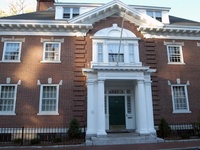“Harvard owns a ridiculous amount of land and real estate,” says the same male final club president. “When you look at the amount owned by Harvard and the clubs, it’s not even a comparison.”
Tara D. Venkatraman ’11, a leader in the Harvard Students for Safe Space Campaign—a College-recognized group that advocates, among other things, increased transparency and inclusiveness on the part of final clubs—agreed, adding that the College should create more on-campus alternatives.
“There’s a common crisis of social space at Harvard,” Venkatraman says. “The administration can do a lot more to confront that.”
NOT JUST A PARTY THING
Members of groups with off-campus space say that although having a space to party on weekends is a draw, it is not the only social benefit of off-campus areas: their spaces also give them a place to hang out and socialize with friends.
“The social aspect of a club is a very small part of it,” says the same male final club president. “It gives you a type of affiliation.”
But whether it is for parties or informal gatherings, students agree that the real estate plays a large role in making these interactions possible.
“If you ask social club members, what’s the best thing about being in a social club, they’ll say the people,” Ebrahim says. “But where do you go to meet the people? It’s the place.”
—Monika L. S. Robbins contributed to the reporting of this article.
—Julie M. Zauzmer contributed to the reporting of this article.
—Staff writer Stephanie B. Garlock can be reached at sgarlock@college.harvard.edu.
—Staff writer Hana N. Rouse can be reached at hrouse@college.harvard.edu.











